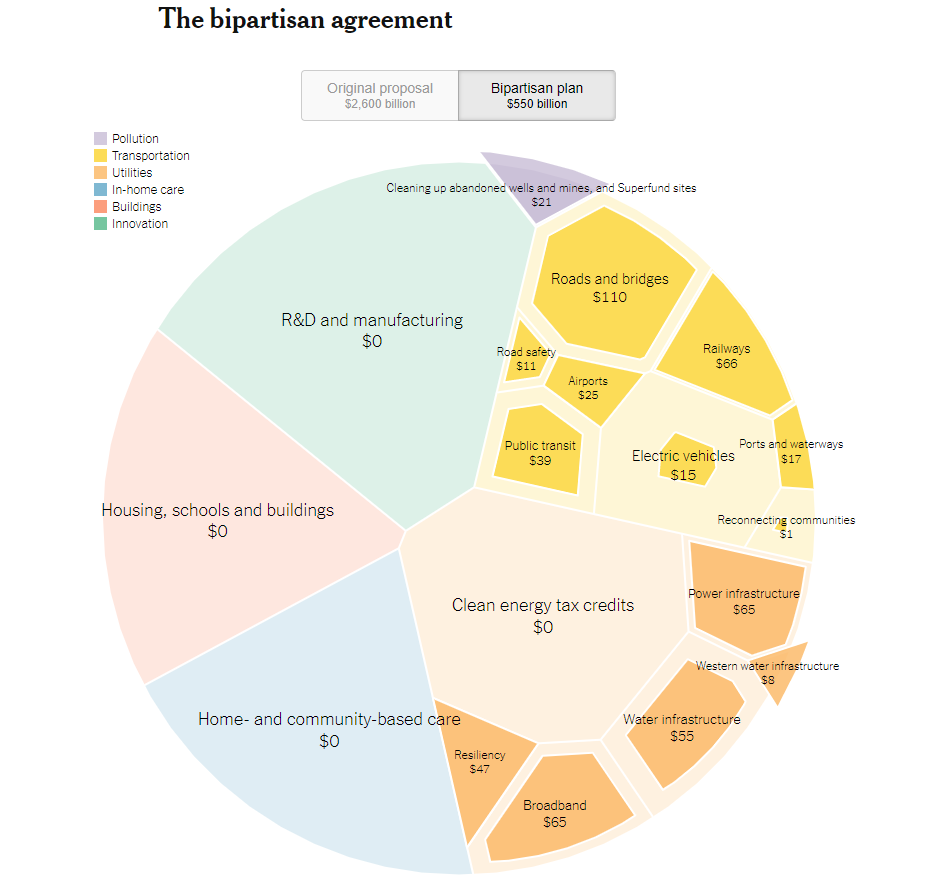General Discussion
In reply to the discussion: This is just going to make it ever HARDER to get the $3.5 Trillion I think [View all]Celerity
(43,138 posts)The $3.5 trillion for BBB and the $2.6 trillion for BIF proposals were Biden's.
The progressives, months ago, agreed to come down from their $6 trillion for BBB and $4 trillion for BIF proposals and agreed to fully support Biden's $3.5 trillion BBB proposal and his $2.6 proposal for BIF (then the progs further agreed to support the BIF after Manchin, Sinema, and the 'moderate' Rethugs gutted out almost 80% of Biden's new spend/tax credits, dropping it form $2.6 trillion all the way down to $550 billion new spend (the other $650 billion in the BIF is simply renewals of mostly transportation programmes that date back to the Trump and Obama administrations).
Build Back Better Act
https://en.wikipedia.org/wiki/Build_Back_Better_Act

Here is the broad spending framework for Biden's $3.5 trillion BBB Act proposal, that Manchin and Sinema have already gutted down to $1.75 trillion
https://www.investopedia.com/here-s-what-s-in-the-usd1-trillion-infrastructure-bill-passed-by-the-senate-5196817
$332 billion for the Banking Committee. Including investments in public housing, the Housing Trust Fund, housing affordability, and equity and community land trusts.
$198 billion for the Energy and Natural Resources Committee. This would develop clean energy. (and remember, almost all environmental spend and tax credits were already gutted from the bi-partisan bill, as I have already shown)
$67 billion for the Environment and Public Works Committee. These monies would fund low-income solar and other climate-friendly technologies.
$1.8 trillion for the Finance Committee. This part of the bill is for investments in working families, the elderly, and the environment. It includes a tax cut for Americans making less than $400,000 a year, lowering the price of prescription drugs, and ensuring the wealthy and large corporations pay their fair share of taxes. (this is prime funding here, and Manchinema want mass cuts here, which blows it up)
$726 billion for the Health, Labor, Education, and Pensions Committee. This addresses universal pre-K for 3- and 4-year-olds, childcare for working families, tuition-free community college, funding for historically black colleges and universities, and an expansion of the Pell Grant for higher education.
$37 billion for the HSGAC Committee. This would electrify the federal vehicle fleet, electrify and rehab federal buildings, improve cybersecurity infrastructure, reinforce border management, invest in green-materials procurement, and invest in resilience. (agin most all was guttend from the other bill already)
$107 billion for the Judiciary Committee. These funds address establishing "lawful permanent status for qualified immigrants."
$20.5 billion for the Indian Affairs Committee. This addresses Native American health programs and facilities, education programs and facilities, housing programs, energy programs, resilience and climate programs, BIA programs and facilities, Native language programs, and the Native Civilian Climate Corps.
$25 billion for the Small Business Committee. This provides for small business access to credit, investment, and markets.
$18 billion for the Veterans Affairs Committee. This funds upgrades to veteran facilities.
$83 billion for the Commerce Committee. This goes to investments in technology, transportation, research, manufacturing, and economic development. It provides funding for coastal resiliency, healthy oceans investments, including the National Oceans and Coastal Security Fund and the National Science Foundation research and technology directorate.
More detail of the $3.5 trillion framework:
Update on The Build Back Better Act
https://www.ifpte.org/bbb-act
This September, Congressional Representatives and Senators working to advance a fiscal year 2022 budget reconciliation package that invests up to $3.5 trillion over 10 years in physical, social, and innovation infrastructure. This legislation, called the Build Back Better Act, is being crafted to include significant parts of President Biden’s American Jobs Plan and American Families Plan and supports domestic manufacturing and R&D, resilient supply chains, affordable housing, advanced energy infrastructure and policies, education, healthcare, childcare, paid leave, labor law enforcement, and more. Through the budget reconciliation process, both the House and Senate can advance the legislation through a simple majority.
Typically, legislation in the Senate requires a procedural vote that needs a 60-vote supermajority to close debate before a bill can advance to a floor vote. If passed by the House, the legislation is expected to move through the Senate committees and finally to the Senate floor. After 20-hour Senate floor debate that cannot be obstructed by the 60-vote filibuster rule, the bill would move to a “vote-a-rama” amendment process where proposed amendments that are germane to the bill will be voted on without debate.
The budget reconciliation process moved forward on August 11 when the Senate passed a budget resolution — titled “S.Con.Res. 14, A Concurrent Resolution on the Budget for Fiscal Year 2022.” The House of Representatives passed Senate Continuing Resolution 14 on August 24. Twelve committees in the House of Representatives have worked with corresponding committees in the Senate as well as the White House to craft legislative text for the Build Back Better Act. Currently, House and Senate leadership, committee chairs, and the White House are conferring and continuing to work on a Build Back Better bill that will have a majority of votes to pass the House and at least 50 votes (plus the vote of the Senate President/Vice President Kamala Harris) to pass in the Senate.
(you can right click and open image in new tab to see the text enlarged)

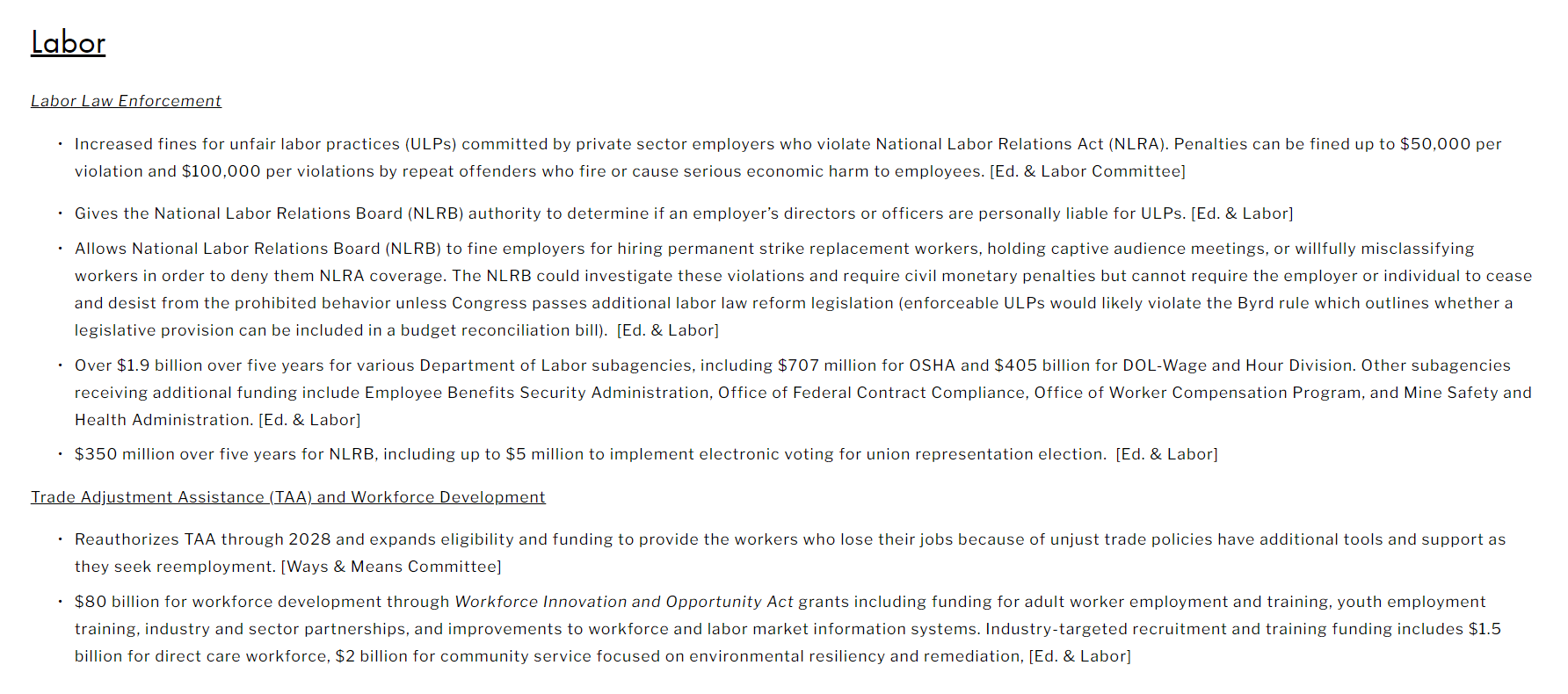


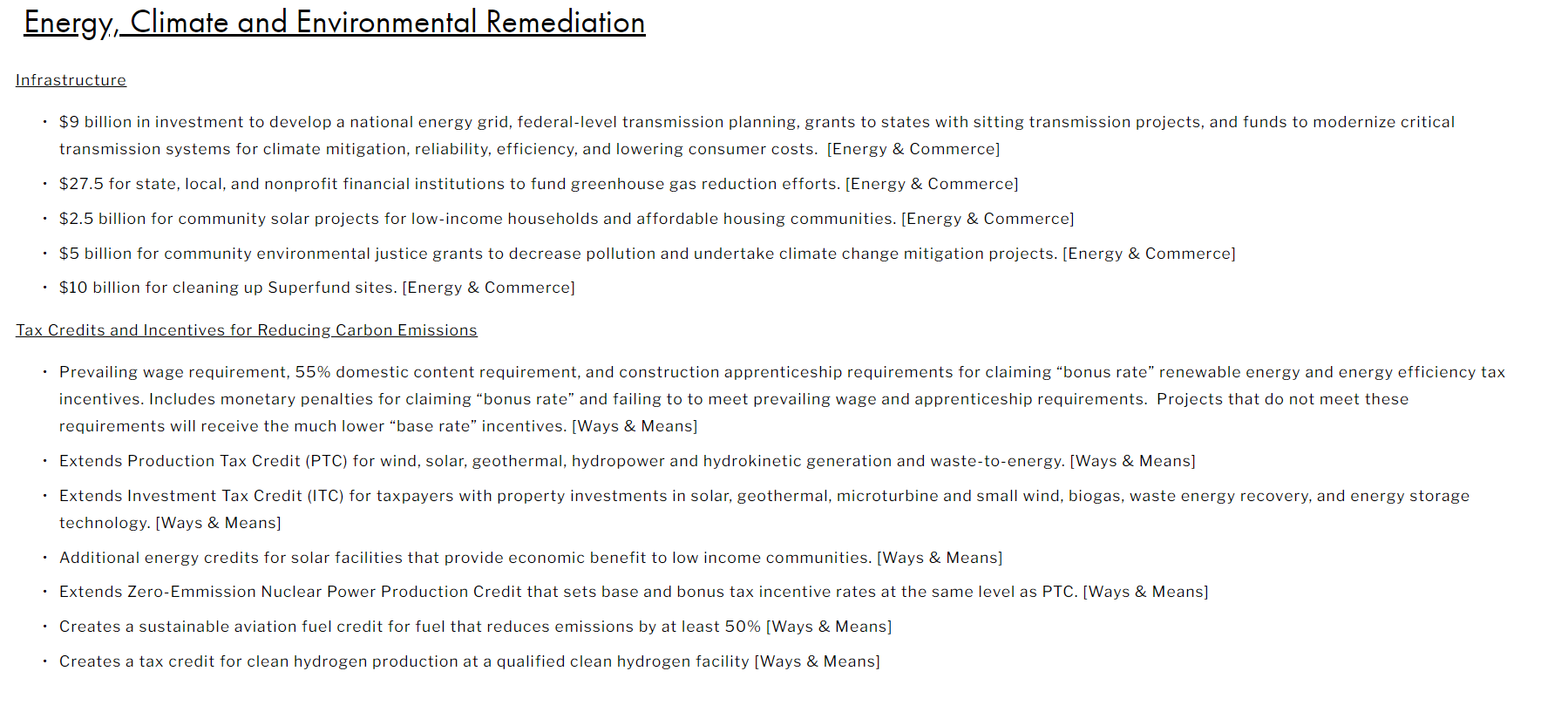

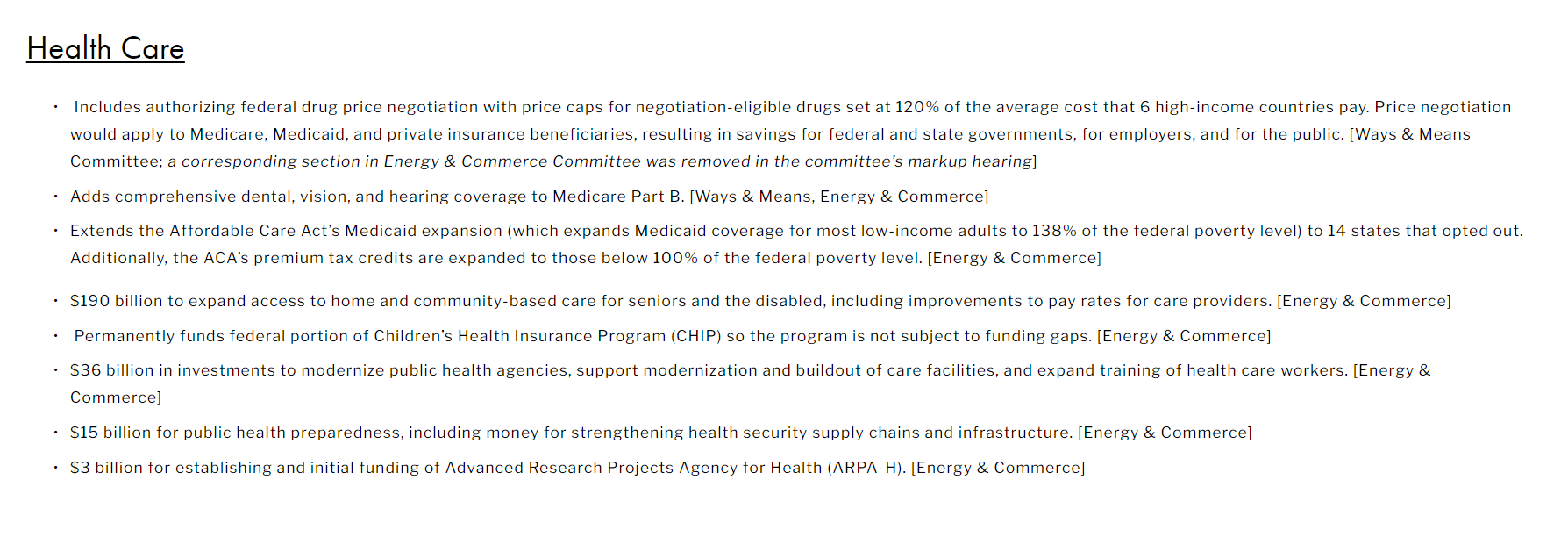
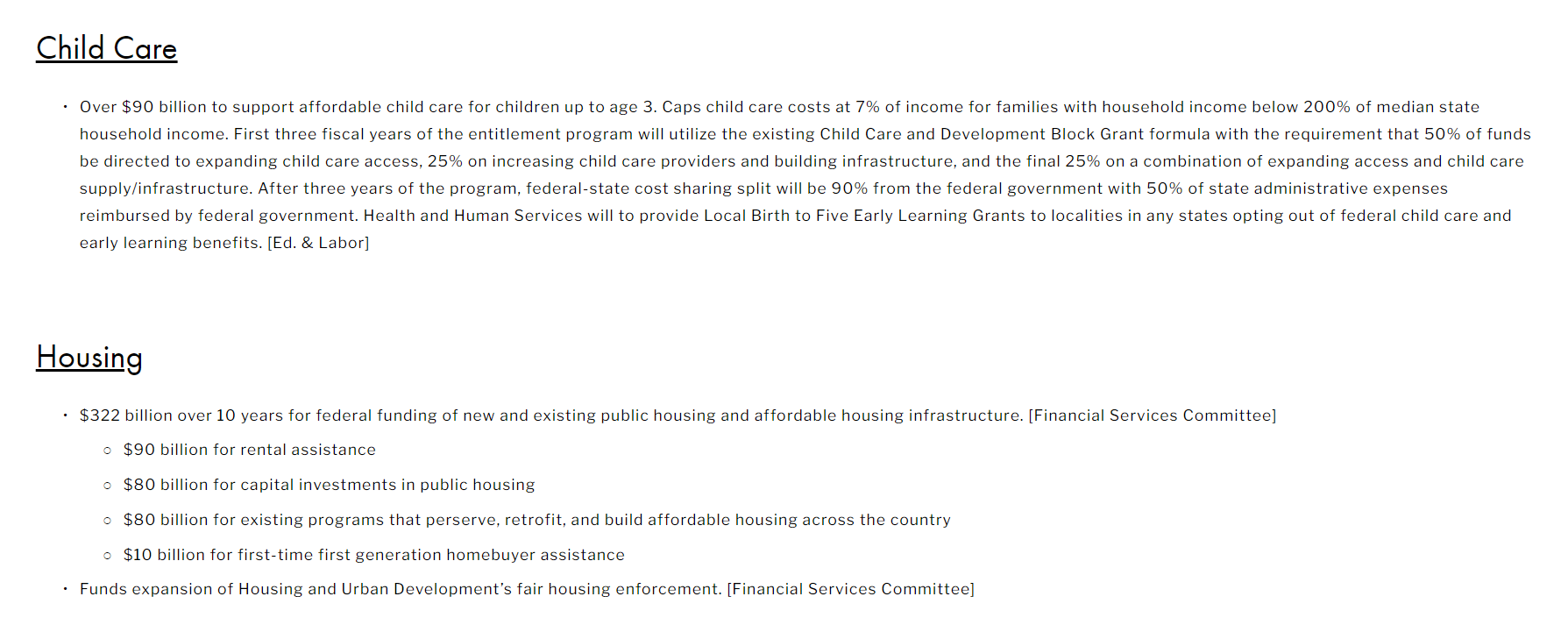
Finally, just for emphasis:
We already said bye bye to almost 80% of the bi-partisan bill's new spend/tax incentives that made up Biden's proposal/framework, and yet the progressives are still on board
The Infrastructure Plan: What’s In and What’s Out (it's brutal)
Biden's original proposal:
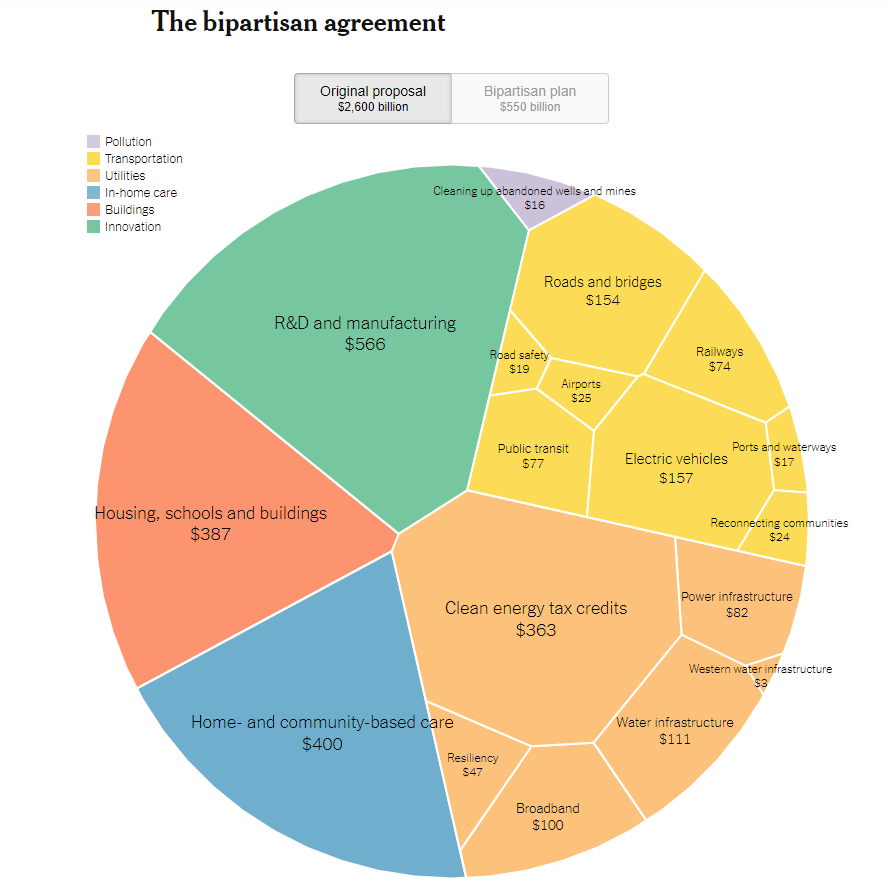
What was left after Manchin, Sinema, and the so-called 'moderate' Rethugs (the very ones that Manchin and Sinema constantly hype as needing to be catered to) took a 2.05 trillion USD hatchet to it:
